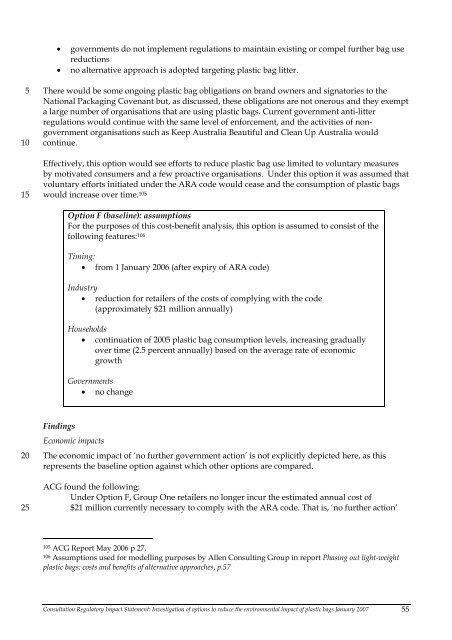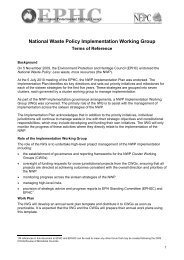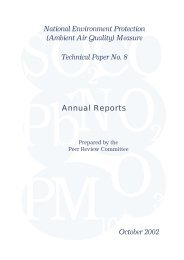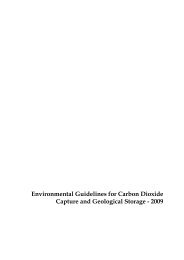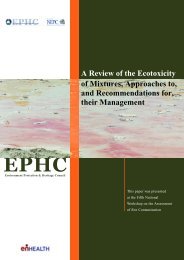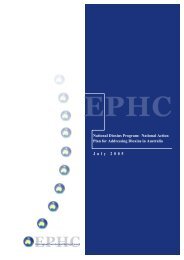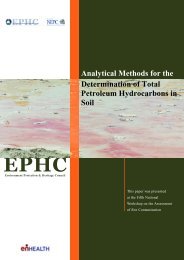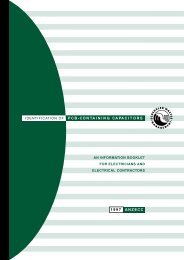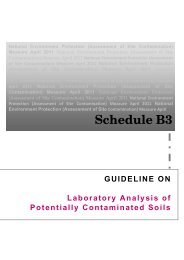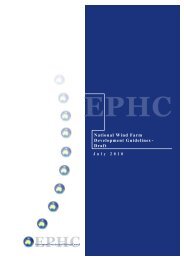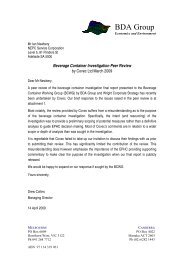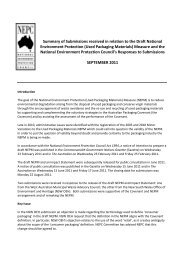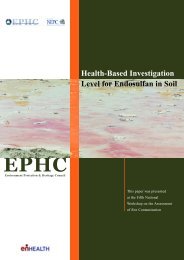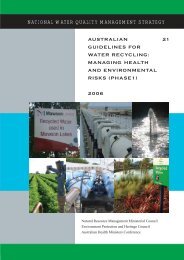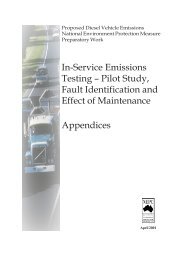Plastic Bags - COAG Standing Council on Environment and Water
Plastic Bags - COAG Standing Council on Environment and Water
Plastic Bags - COAG Standing Council on Environment and Water
You also want an ePaper? Increase the reach of your titles
YUMPU automatically turns print PDFs into web optimized ePapers that Google loves.
• governments do not implement regulati<strong>on</strong>s to maintain existing or compel further bag use<br />
reducti<strong>on</strong>s<br />
• no alternative approach is adopted targeting plastic bag litter.<br />
5<br />
10<br />
15<br />
There would be some <strong>on</strong>going plastic bag obligati<strong>on</strong>s <strong>on</strong> br<strong>and</strong> owners <strong>and</strong> signatories to the<br />
Nati<strong>on</strong>al Packaging Covenant but, as discussed, these obligati<strong>on</strong>s are not <strong>on</strong>erous <strong>and</strong> they exempt<br />
a large number of organisati<strong>on</strong>s that are using plastic bags. Current government anti-litter<br />
regulati<strong>on</strong>s would c<strong>on</strong>tinue with the same level of enforcement, <strong>and</strong> the activities of n<strong>on</strong>government<br />
organisati<strong>on</strong>s such as Keep Australia Beautiful <strong>and</strong> Clean Up Australia would<br />
c<strong>on</strong>tinue.<br />
Effectively, this opti<strong>on</strong> would see efforts to reduce plastic bag use limited to voluntary measures<br />
by motivated c<strong>on</strong>sumers <strong>and</strong> a few proactive organisati<strong>on</strong>s. Under this opti<strong>on</strong> it was assumed that<br />
voluntary efforts initiated under the ARA code would cease <strong>and</strong> the c<strong>on</strong>sumpti<strong>on</strong> of plastic bags<br />
would increase over time. 105<br />
Opti<strong>on</strong> F (baseline): assumpti<strong>on</strong>s<br />
For the purposes of this cost-benefit analysis, this opti<strong>on</strong> is assumed to c<strong>on</strong>sist of the<br />
following features: 106<br />
Timing:<br />
• from 1 January 2006 (after expiry of ARA code)<br />
Industry<br />
• reducti<strong>on</strong> for retailers of the costs of complying with the code<br />
(approximately $21 milli<strong>on</strong> annually)<br />
Households<br />
• c<strong>on</strong>tinuati<strong>on</strong> of 2005 plastic bag c<strong>on</strong>sumpti<strong>on</strong> levels, increasing gradually<br />
over time (2.5 percent annually) based <strong>on</strong> the average rate of ec<strong>on</strong>omic<br />
growth<br />
Governments<br />
• no change<br />
20<br />
25<br />
Findings<br />
Ec<strong>on</strong>omic impacts<br />
The ec<strong>on</strong>omic impact of ‘no further government acti<strong>on</strong>’ is not explicitly depicted here, as this<br />
represents the baseline opti<strong>on</strong> against which other opti<strong>on</strong>s are compared.<br />
ACG found the following:<br />
Under Opti<strong>on</strong> F, Group One retailers no l<strong>on</strong>ger incur the estimated annual cost of<br />
$21 milli<strong>on</strong> currently necessary to comply with the ARA code. That is, ‘no further acti<strong>on</strong>’<br />
105 ACG Report May 2006 p 27.<br />
106 Assumpti<strong>on</strong>s used for modelling purposes by Allen C<strong>on</strong>sulting Group in report Phasing out light-weight<br />
plastic bags: costs <strong>and</strong> benefits of alternative approaches, p.57<br />
C<strong>on</strong>sultati<strong>on</strong> Regulatory Impact Statement: Investigati<strong>on</strong> of opti<strong>on</strong>s to reduce the envir<strong>on</strong>mental impact of plastic bags January 2007 55


